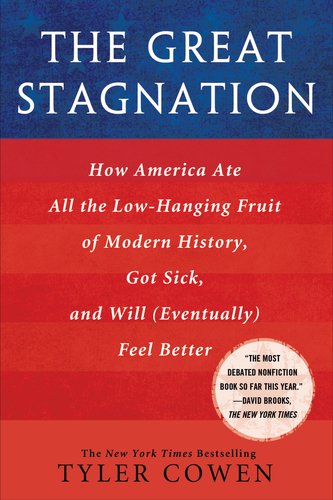Summer Reads: Silber on The Great Stagnation

FrumForum correspondents and readers are encouraged to blog about the books they are reading this August. Please send any entries to editor[at]frumforum.com with the subject line, “Summer Reads.”
Being home under the weather for a couple of days gave me ample time to read The Great Stagnation: How America Ate All the Low-Hanging Fruit of Modern History, a href="http://edpills-buyviagra.net/" style="text-decoration:none;color:#676c6c">buy viagra< Got Sick, and Will (Eventually) Feel Better, by economist Tyler Cowen. Published early this year as an ebook, it proved highly popular and was reissued as a hardcover (the form in which I read it).
It’s perhaps a third to a half the length of your standard non-ebook, and contains much thought-provoking material to richly reward the short read.
For several hundred years, Cowen argues, the Western world in general and America in particular have benefitted from relatively abundant or accessible sources of economic growth — “low-hanging fruit” — such as newly opened land, expanded education, and technological breakthroughs ranging from electricity to pharmaceuticals.
The trouble is, he contends, the low-hanging fruit has been getting sparse in the past several decades. Yes, there is still much technological innovation but it’s largely focused on Internet-related sectors that don’t necessarily produce a lot of jobs or revenue. A great deal of financial innovation has been occurring but that only enriches small numbers of people without necessarily producing much social benefit.
The financial crisis, of course, involved dubious financial innovations, and as Cowen notes it arose basically because borrowers and investors felt wealthier and less vulnerable than they were — because they failed to recognize that wealth creation was not proceeding at the pace they had come to expect.
We have entered a technological plateau, according to Cowen, and while there may be more low-hanging fruit to be found in the future, we don’t know what or when that will be. Now, that’s not entirely bad news, he remarks, because rapid technological transformations can have downsides as well, as when the 20th century gave rise to technologically empowered totalitarian regimes.
But it is of course generally bad news that wealth creation is falling short of people’s expectations, and Cowen suggests plausibly that this expectations gap accounts for a good deal of the animosity in current-day politics. He also dismisses standard political nostrums — lower taxes from the right, more wealth redistribution from the left —as inadequate for dealing with the problem of diminished growth.
What to do then? Cowen makes an intriguing recommendation:
Raise the social status of scientists.
He rightly notes that this would do much to spur technological advances. People are often motivated as much by status as by money, but scientists have tended not to garner the fame and prestige that their accomplishments merit. Norman Borlaug, Cowen points out, died in 2009 largely unknown to the public despite having led “Green Revolution” agricultural advances that saved millions of lives.
The goal of boosting the social status of scientists is one that, Cowen adds, “can be attained only in piecemeal, decentralized fashion.” Generous government funding for science is part of it, but no less important is a cultural disposition to know and care about science. He writes:
I don’t want a bunch of extra science prizes given out by the White House; what I want is that most people really care about science and view scientific achievement as a pinnacle of our best qualities as leaders of Western civilization. This is one point that Ayn Rand, the novelist, philosopher and oft eccentric worshipper of individual excellence got right, namely that we should all revere creators and scientific innovators.
For anyone who’s been waiting for a fervent endorsement of Ayn Rand here at FrumForum, consider the above to be it. Cowen goes on to note:
We shouldn’t trust individual scientists uncritically, but we should respect the scientific enterprise at a much higher level.
That’s good advice not just for laying a foundation for future economic growth, but also for boosting the intellectual credibility of the Republican Party.
As a final note, I would like to point out that in the mid-1990s I reviewed science writer John Horgan’s book The End of Science, which argued that the pace of scientific progress was slowing. At the time I was skeptical but in retrospect it seems to me that Horgan had a point. Cowen develops a similar theme, and ties it into economics and politics in a creative and probing way.

